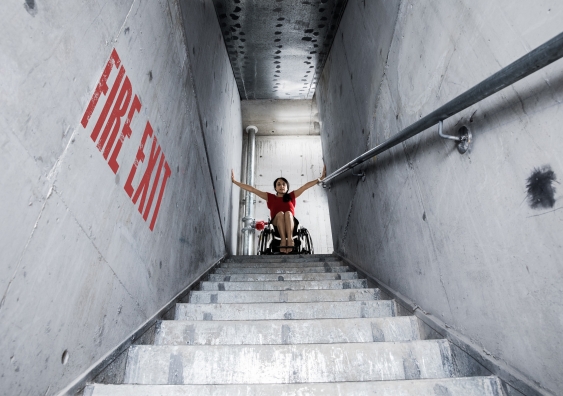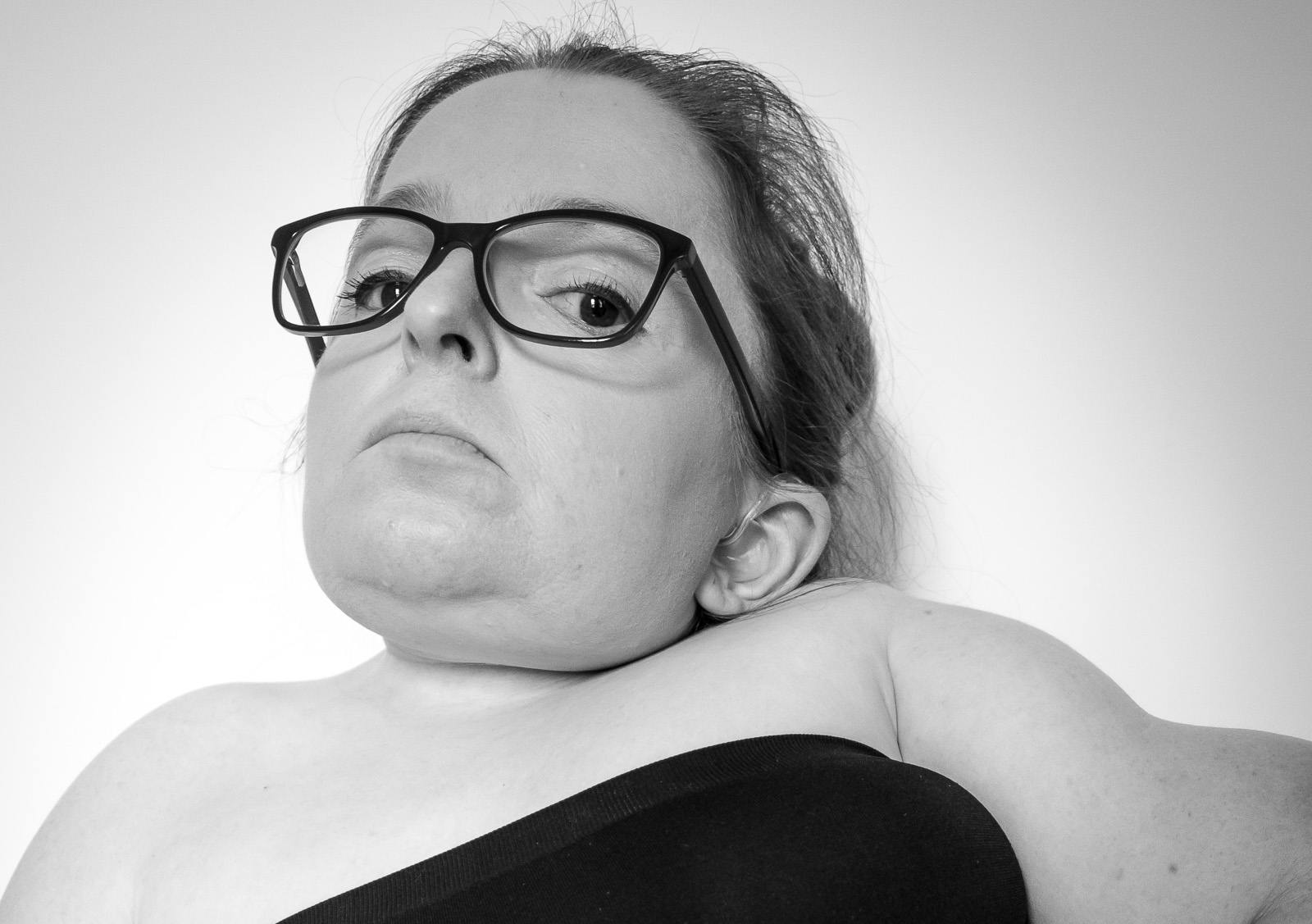A new photographic series explores the embodied experiences of women with disability.

Fire! Escape! by Evianne Grosvenor is one of the self-portraits in the new exhibition Through my eyes, demonstrating the oversight when it comes to considering people with disability in emergency planning. Photo: Evianne Grosvenor
A new photography exhibition by women with disability aims to challenge our preconceptions of women’s bodies. Showcasing feminist self-portraits of six women, addresses limiting and negative assumptions of disability.
The exhibition is the culmination of a series of workshops facilitated by Diane Macdonald, a PhD candidate at Black Dog Institute and the School of Psychiatry, UNSW Sydney. Ms Macdonald is investigating whether photography can change the way we view and think about disability.
“Women with disability face participation barriers that adversely affect their health, income levels and access to education and employment,” Ms Macdonald says.
The exhibition hopes to unsettle reductive views of disability that contribute to these kinds of barriers, she says. But the project isn’t just about improving our understanding of living with a disability, it’s about broadening our definition of female identity, she says.
“We are trying to change the narrative around what we see and what we don’t see. And by not seeing it, what message are we sending out?
“Seeing and thinking more about diversity in bodies and abilities benefits all women,” she says.

Power by Marusha Rowe Pride in Through my eyes. “Having a disability, people can overpower me, taking control of my life and the way they think I should live. But the one thing I have the power to control are my thoughts and how I love,” Ms Rowe Pride writes. Photo: Marusha Rowe Pride
The exhibition, curated by Ms Macdonald, is a joint initiative between the Black Dog Institute and UNSW Sydney, supported by , and at Deakin University.
Ms Macdonald, who has a Master of Documentary Photography, focuses on the intersection of photography and gender justice through her research. This project is an organic extension of her previous photographic work on violence against women.
Ms Macdonald is using photovoice, a qualitative research method that uses photography to give marginalised communities greater agency in research that affects them. Participants take photos and share personal narratives to identify and represent issues of importance to them.
Through the workshop setting, Ms Macdonald introduced the women to a range of feminist photographers, and examined issues of representation, including the politics of appearance, sexuality, exclusion/inclusion and power imbalances.
Each week the women contributed photographic self-portraits based around their discussions in the previous workshop, and shared personal experiences. This had some unexpected benefits with participants uncovering similar experiences and for some even refining their self-conception.
“There was some wonderful discussion,” Karen Peacock, one of the participants, says. Ms Peacock grew up in a rural town without any peers with disability. “There was a discussion about childhood bullying that everyone could identify with and that discussion arose because of somebody’s wonderful photos.”
Another participant Marusha Rowe Pride found the autonomy of the experience incredibly beneficial in shaping her sense of self: “It made me more self-aware of my views in life and it just made me think about myself as a woman: [who] I want to become, about who I am now.
“It was more about us taking control and not living through the lens of [others], but ourselves through our eyes,” she says.

This is me, by Melinda Montgomery. “This is the side of me where I’m at my purest, incredibly raw and vulnerable. I protect this side very fiercely, which is why I feel quite proud to have pushed myself outside my comfort zone,” Ms Montgomery writes. Photo: Melinda Montgomery
Melinda Montgomery, another participant, says initially being in front of the camera was quite confronting, but it became “very liberating”: “Maybe I’m not as monster-like as I’ve always thought… I don’t want to be too cliché, but I can sort of see the positives, the beauty in the way I pose myself in front of the lens”.
Professor Katherine Boydell, who is supervising Ms Macdonald’s thesis, says the project demonstrates the benefits to be gained from this type of collaborative arts-based research: “Through my eyes offers a more nuanced understanding of living with disability, through its commitment to increasing the integrity and applicability through participation.
“For those of us in the research team, it caused us to consider within ourselves the way we look, stare and gaze at our fellow women. The participants’ photos and stories showed us how to refocus, to see beyond disability and into a person’s individuality.
“Moreover, they led us down a path to re-see and re-contextualise our own imperfect, beautiful bodies through a more inclusive, empathetic lens.”
Through my eyes is supported by Randwick City Council and is , Maroubra from 6 October. Photographers Evianne Grosvenor and Melinda Montgomery will also present a series of their self-portraits from the exhibition in an as part of UNSW’s .
The exhibition features work by Kerry Fountain, Evianne Grosvenor, Melinda Montgomery, Karen Peacock, Marusha Rowe Pride and Malissa Thorpe.






